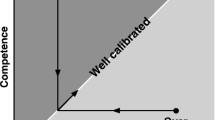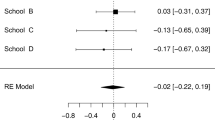Abstract
This paper problematises ‘confidence’ as a frequently used explanation for performance in the mathematics classroom. I report on an interview-based study of how some English ‘Advanced’ level (16+) students who have chosen to study mathematics, and their teachers, speak about confidence with respect to the learning of mathematics. I outline what constitutes confident learners for these teachers and, differently, for their students and what the students feel teachers could do to improve the students’ confident state. I discuss the implications of this for the education of prospective teachers of mathematics.
Similar content being viewed by others
References
L.Y. Abramson M.E. Seligman J. Teasdale (1978) ArticleTitleLearned helplessness in humans: Critique and reformulation Journal of Abnormal Psychology 87 49–74
Fran Arbaugh (2003) ArticleTitleStudy groups as a form of professional development for secondary mathematics teachers Journal of Mathematics Teacher Education 6 IssueID2 139–163
D. Bar-Tal (1990) Group beliefs. A conception for analysing group structure, processes and behaviour Springer New York
J. Boaler (1997) Experiencing school mathematics Open University Press Buckingham
R. Borasi (1996) Reconceiving mathematics instruction. Ablex Norwood, NJ
S. Brown M. Walter (1990) The art of problem posing Lawrence Erlbaum Hillsdale, NJ
J. Bruner (1990) Acts of meaning Harvard University Press London
E. Burman I. Parker (Eds) (1994) Discourse analytic research: Repertoires and readings of texts in action. Routledge London
L. Burton (1989) Images of mathematics P. Ernest (Eds) Mathematics teaching: The state of the art The Falmer Press Lewes, East Sussex 180–187
L. Burton (Eds) (1999) Learning mathematics: from hierarchies to networks. Falmer Press London
L. Burton (2001) Mathematics? no thanks–choosing and then rejecting mathematics S. Johnston-Wilder (Eds) Proceedings of a National Day Conference: Key Stage 3 Mathematics Teachers: The Current Situation, Initiatives and Visions The Open University Centre for Mathematics Education Milton Keynes
L. Buxton (1991) Math Panic? Heinemann London
S.F. Chipman L.R. Brush D.M. Wilson (1985) Women and mathematics: Balancing the equation. Lawrence Erlbaum Hillsdale, NJ
P.S. Clute (1984) ArticleTitleAnxiety, method, and college mathematics achievement Journal for Research in Mathematics Education 15 IssueID1 50–58
L. English (Eds) (2002) Handbook of international research in mathematics education. Lawrence Erlbaum Hillsdale, NJ
J. Evans (2000) Adults’ mathematical thinking and emotions: A study of numerate practices Routledge & Kegan paul London
E. Fennema (1996) Scholarship, gender and mathematics P.F. Murphy C.V. Gipps (Eds) Equity in the classroom: Towards effective pedagogy for girls and boys Falmer Press London 73–80
E. Fennema P. Peterson (1985) Autonomous learning behavior: A possible explanation of gender-related differences in mathematics L.C. Wilkinson C.B. Marrett (Eds) Gender influences in classroom interaction Academic Press Orlando, FL 17–35
E. Fennema J.A. Sherman (1977) ArticleTitleSex-related differences in mathematics achievement, spatial visualization and affective factors American Educational Research Journal 14 IssueID1 51–71
E. Fennema J.A. Sherman (1978) ArticleTitleSex-related differences in mathematics achievement, spatial visualization and affective factors: A further study Journal for Research in Mathematics Education 9 189–203
H.J. Forgasz G.C. Leder J. Thomas (2003) Mathematics participation, achievement and attitudes: What’s new in Australia L. Burton (Eds) Which way social justice in mathematics education? Praeger New York 241–260
Freiberg, P. (1991). Self-esteem gender gap widens in adolescence. APA Monitor, April, p. 29.
B. Jaworski (1994) Investigating mathematics teaching Falmer Press London
B. Jaworski (1999) Tensions in teachers’ conceptualizations of mathematics and of teaching L. Burton (Eds) Learning mathematics: from hierarchies to networks Falmer Press London 153–172
J. Kenway S. Willis (Eds) (1990) Hearts and minds. Falmer Press Lewes
A. Lachance J. Confrey (2003) ArticleTitleInterconnecting content and community: A qualitative study of secondary mathematics teachers Journal of Mathematics Teacher Education 6 IssueID2 107–137
G.C. Leder (1990) Gender differences in mathematics: An overview Elizabeth Fennema Gilah C. Leder (Eds) Mathematics and gender Teachers College Press London 10–26
G.C. Leder E. Pehkonen G. Törner (2002) Setting the scene G.C. Leder E. Pehkonen G. Törner (Eds) Beliefs: A hidden variable in mathematics education? Kluwer Academic Publishers Dordrecht 1–10
M. Lyons K. Lynch S. Close E. Sheerin P. Boland (2003) Inside classrooms: the teaching and learning of mathematics in social context Institute of Public Administration (available at www.ipa.ie) Dublin
K. Lynch A. Lodge (2002) Equality and power in schools Routledge & Kegan Paul London
Malmivuori, M-L. (2001). The dynamics of affect, cognition, and social environment in the regulation of personal learning processes: The case of mathematics. Available at http://ethesis.helsinki.fi/julkaisut/kas/kaava/vk/malmivuori/
J. Mason (2003) ArticleTitleSeeing worthwhile things Journal of Mathematics Teacher Education 6 IssueID3 281–293
D. McLeod S. McLeod (2002) Synthesis–Beliefs and mathematics education: Implications for learning, teaching and research G.C. Leder E. Pehkonen G. Törner (Eds) Beliefs: A hidden variable in mathematics education? Kluwer Academic Publishers Dordrecht 115–123
H. Mehan (1979) Learning lessons: Social organization in the classroom. Harvard University Press Cambridge, MA
H. Mendick (2003) Choosing maths/doing gender: A look at why there are more boys than girls in advanced mathematics classes in England L. Burton (Eds) Which way social justice in mathematics education? Praeger New York 169–187
P. Op ‘T Eynde E. Corte Particlede L. Verschaffel (2002) Framing students’ mathematical beliefs: A quest for conceptual clarity and a comprehensive categorization G.C. Leder E. Pehkonen G. Törner (Eds) Beliefs: A hidden variable in mathematics education? Kluwer Academic Publishers Dordrecht 13–37
H. Povey L. Burton C. with Angier M. Boylan (1999) Learners as authors in the mathematics classroom L. Burton (Eds) Learning mathematics: from hierarchies to networks Falmer Press London 232–245
S. Regan Particlede Bere (2003) ArticleTitleEvaluating the implications of complex interprofessional education for improvements in collaborative practice: A multidimensional model British Educational Research Journal 29 IssueID1 105–124
G.M.A. Stanic L.E. Reyes (1995) Attitudes, persistence, and mathematics achievement: Qualifying race and sex differences W.G. Secada E. Fennema L. B. Adajian (Eds) New directions for equity in mathematics education Cambridge University Press Cambridge 258–276
J.D. Volmink (1994) Mathematics by all S. Lerman (Eds) Cultural perspectives on the mathematics classroom Kluwer Academic Publishers Dordrecht 51–67
Walkerdine, V. (1990). Difference, cognition and mathematics education, For the Learning of Mathematics, 10(3), 51–55.
T.D. Wilson P.W. Linville (1982) ArticleTitleImproving the performance of college freshmen with attributional techniques Journal of Personality and Social Psychology 49 287–293
T. Wood (1994) Patterns of interaction and the culture of mathematics classrooms S. Lerman (Eds) Cultural perspectives on the mathematics classroom Kluwer Academic Publishers. Dordrecht 149–168
Author information
Authors and Affiliations
Corresponding author
Rights and permissions
About this article
Cite this article
Burton, L. Confidence is Everything” – Perspectives of Teachers and Students on Learning Mathematics. J Math Teacher Educ 7, 357–381 (2004). https://doi.org/10.1007/s10857-004-3355-y
Issue Date:
DOI: https://doi.org/10.1007/s10857-004-3355-y




